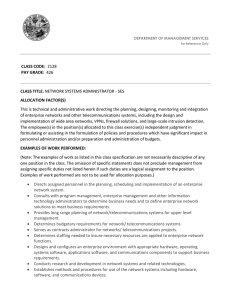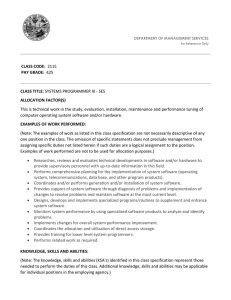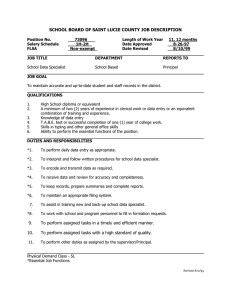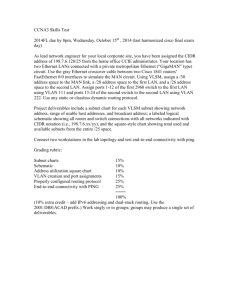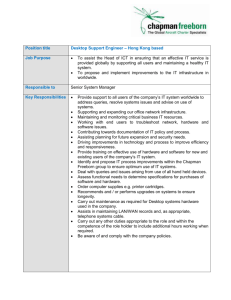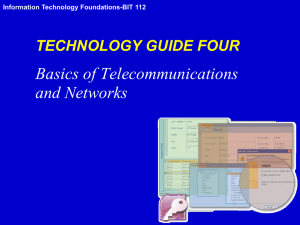LOS ANGELES COMMUNITY COLLEGE DISTRICT CLASS SPECIFICATION PERSONNEL COMMISSION CLASS CODE 1074
advertisement
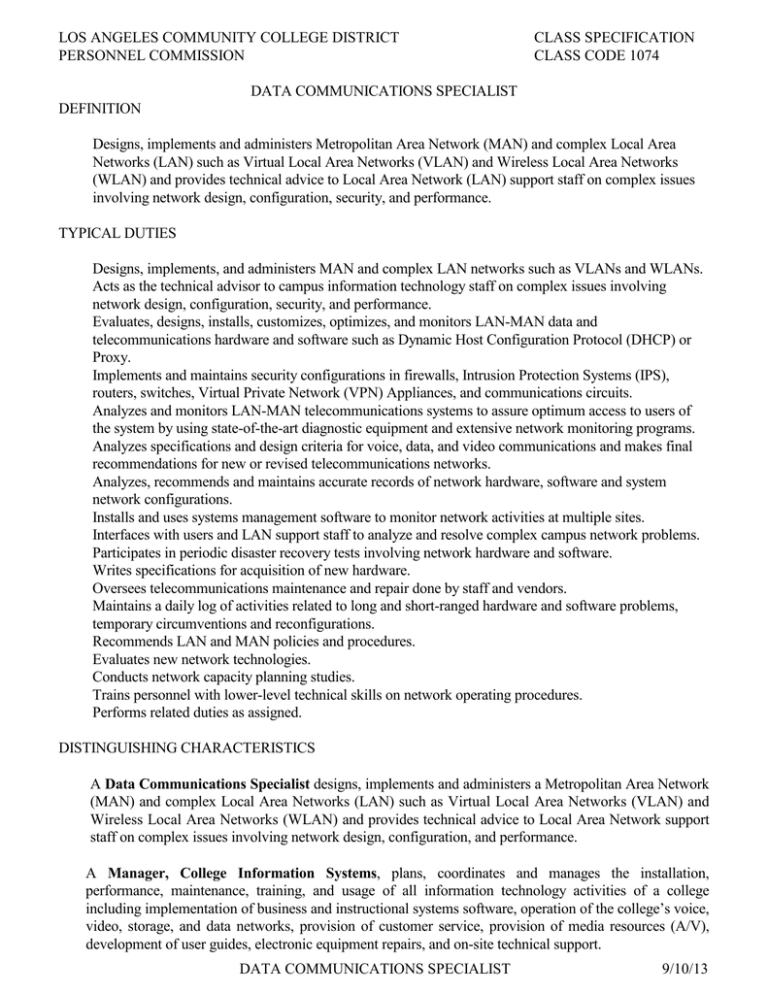
LOS ANGELES COMMUNITY COLLEGE DISTRICT PERSONNEL COMMISSION CLASS SPECIFICATION CLASS CODE 1074 DATA COMMUNICATIONS SPECIALIST DEFINITION Designs, implements and administers Metropolitan Area Network (MAN) and complex Local Area Networks (LAN) such as Virtual Local Area Networks (VLAN) and Wireless Local Area Networks (WLAN) and provides technical advice to Local Area Network (LAN) support staff on complex issues involving network design, configuration, security, and performance. TYPICAL DUTIES Designs, implements, and administers MAN and complex LAN networks such as VLANs and WLANs. Acts as the technical advisor to campus information technology staff on complex issues involving network design, configuration, security, and performance. Evaluates, designs, installs, customizes, optimizes, and monitors LAN-MAN data and telecommunications hardware and software such as Dynamic Host Configuration Protocol (DHCP) or Proxy. Implements and maintains security configurations in firewalls, Intrusion Protection Systems (IPS), routers, switches, Virtual Private Network (VPN) Appliances, and communications circuits. Analyzes and monitors LAN-MAN telecommunications systems to assure optimum access to users of the system by using state-of-the-art diagnostic equipment and extensive network monitoring programs. Analyzes specifications and design criteria for voice, data, and video communications and makes final recommendations for new or revised telecommunications networks. Analyzes, recommends and maintains accurate records of network hardware, software and system network configurations. Installs and uses systems management software to monitor network activities at multiple sites. Interfaces with users and LAN support staff to analyze and resolve complex campus network problems. Participates in periodic disaster recovery tests involving network hardware and software. Writes specifications for acquisition of new hardware. Oversees telecommunications maintenance and repair done by staff and vendors. Maintains a daily log of activities related to long and short-ranged hardware and software problems, temporary circumventions and reconfigurations. Recommends LAN and MAN policies and procedures. Evaluates new network technologies. Conducts network capacity planning studies. Trains personnel with lower-level technical skills on network operating procedures. Performs related duties as assigned. DISTINGUISHING CHARACTERISTICS A Data Communications Specialist designs, implements and administers a Metropolitan Area Network (MAN) and complex Local Area Networks (LAN) such as Virtual Local Area Networks (VLAN) and Wireless Local Area Networks (WLAN) and provides technical advice to Local Area Network support staff on complex issues involving network design, configuration, and performance. A Manager, College Information Systems, plans, coordinates and manages the installation, performance, maintenance, training, and usage of all information technology activities of a college including implementation of business and instructional systems software, operation of the college’s voice, video, storage, and data networks, provision of customer service, provision of media resources (A/V), development of user guides, electronic equipment repairs, and on-site technical support. DATA COMMUNICATIONS SPECIALIST 9/10/13 DISTINGUISHING CHARACTERISTICS (Cont.) A Senior Computer and Network Support Specialist plans, organizes, coordinates, schedules, assigns, and reviews the work of assigned technical staff and designs, implements, and administers campus-wide voice, video, storage, and data network(s) at a college or voice, video, storage, and data network(s) at the District Office. SUPERVISION General supervision is received from a classified manager or administrator. Technical assistance is provided to staff with lower-level technical skills. CLASS QUALIFICATIONS Knowledge of: Principles of Metropolitan Area Network (MAN) design, implementation, and administration Principles of Local Area Network (LAN) design, implementation, and administration such as Virtual Local Area Networks (VLAN) and Wireless Local Area Networks (WLAN) Principles of design, development, implementation, storage, and operation of data (both local and wide area), video and voice telecommunications systems Characteristics, capabilities, and uses of telecommunications system components, including data communications lines and equipment, data-access arrangement equipment, input and output devices, communications processors, line concentrators, telecommunications software, switching networks, multiplexers, terminals, modems, and voice PBX systems Computer networks: ETHERNET, 10 Base-T, LAN, WAN, PBX/KSU, voice systems Communications network architectures, programmable protocol analyzers, and communications hardware Network security and access control such as Intrusion Protection Systems (IPS) and Virtual Private Network (VPN) Appliances Components, capabilities and uses of servers and other computer equipment Operation and application of a wide variety of network software Troubleshooting methods and equipment used in the detection of malfunctions and the maintenance of optimum operating efficiency of telecommunications systems Operation of data scopes, programmable protocol analyzers and voice/data test sets Spelling, punctuation, and English usage Principles of recordkeeping Principles of training Ability to: Design and implement MAN and complex LAN systems such as Virtual Local Area Networks (VLAN) and Wireless Local Area Networks (WLAN) Monitor network security and performance and devise solutions when problems occur Modify and implement network software configurations Analyze network systems problems and devise solutions Write technical specifications for the acquisition of network hardware and software Write concise and comprehensive status reports related to management of assigned network activities Apply principles and techniques of network design to meet specific user/office needs Assess user needs and provide appropriate training and support DATA COMMUNICATIONS SPECIALIST 9/10/13 Ability to: (Cont.) Create clear guidelines and procedures Provide leadership and technical assistance to others Achieve maximum utilization and efficiency of network resources by using network hardware and software in the most efficient manner Use software to monitor performance and analyze network traffic Maintain installation, service and repair records Establish and maintain cooperative working relationships with District staff, network users, and equipment service vendors Analyze and express difficult concepts in oral and written communications Learn the characteristics of new computer systems, software, and hardware and update technical skills to adapt to changing technology ENTRANCE QUALIFICATIONS Education and Experience: A. Graduation from a recognized four-year college or university preferably with a major in computer science, computer information systems, computer engineering or a related field AND two years of recent, full-time paid experience in the administration of servers and management of routers, firewalls and switches in complex Local Area Networks. OR B. Graduation from high school or its equivalent AND twenty-four (24) semester units from a recognized college or university or completion of an equivalent certification training program in computer science, computer information systems, computer engineering or a related field AND four years of recent, full-time paid experience in the administration of servers and management of routers, firewalls and switches in complex Local Area Networks. Vendor training courses in router and firewall management is highly desirable. A current certification as a Certified Cisco Network Professional (CCNP) or Certified Cisco Network Associate (CCNA) or equivalent is desirable. Special: A valid Class “C” California driver's license may be required for some positions. Travel to locations throughout the District may be required for some positions. Reasonable Accommodation Our class specification generally describes the duties, responsibilities, and requirements characteristic of the position(s) within this job class. The duties, responsibilities, and requirements of a particular position within this class may vary from the duties of other positions within the class. In accordance with the Americans with Disabilities Act (ADA), the Los Angeles Community College District provides reasonable accommodation to qualified individuals with covered disabilities on a case-by-case basis throughout the application, examination, and hiring processes and throughout employment. If an individual is in doubt about his or her ability to perform the duties and responsibilities of a position or possession of any other requirement noted in a class specification or job announcement, he or she should always apply for a position and request reasonable accommodation at the appropriate time. Revised DATA COMMUNICATIONS SPECIALIST 9/10/13
